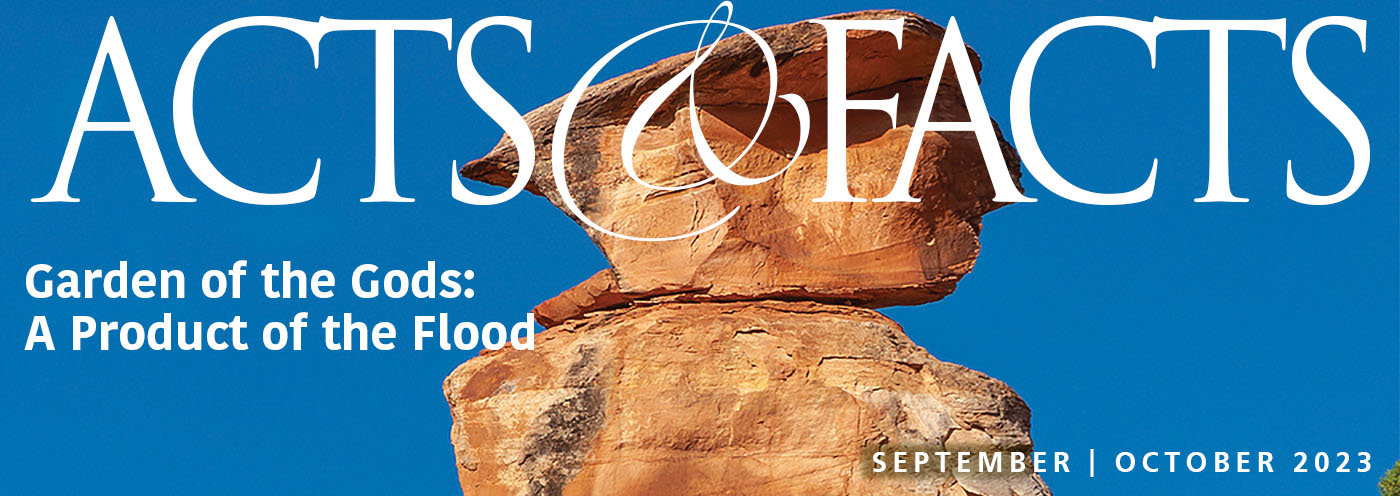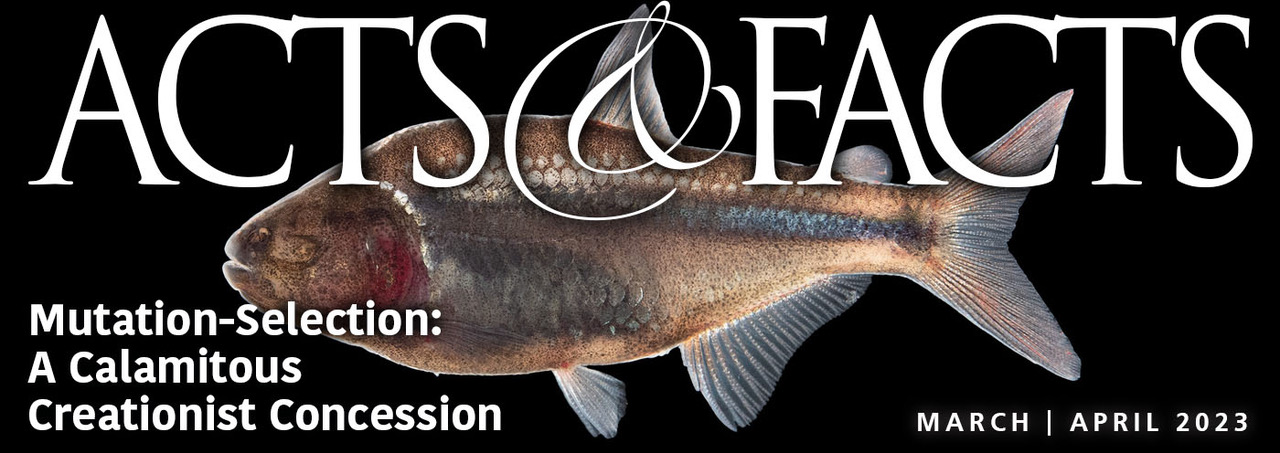In 1934, just before his death, the eminent Russian psychologist,
Lev S. Vygotsky, 1 concluded his book on Thought
and Language with a quotation from Faust which insisted that,
"In the beginning was the deed." According to Vygotsky,
the word came later, crowning the deed. What he had in mind, of
course, was the development of intelligence in children. He was
not concerned with the ultimate question of how there came to
be order in the universe, yet it is the fundamental faith of science
that there is order in the universe, and obviously it had to come
to be by some means. Vygotsky boldly asserted that order arises
from action rather than words. He left God out of the picture
and committed himself to the evolutionary doctrine of secularism.
One of the Hebrew Psalmists wrote, "Why does the wicked man
revile God? Why does he say to himself, 'He won't call me to account'?"
(New International Version, Psalm 10:13). Within a few months
after Vygotsky concluded his book, he died. He never saw his thirty-fifth
birthday.
Secularists often pay homage to blind chance as the source of
the order that science finds in the physical and biological world.
Yet they often lament the fact that evolutionary wisdom is not
maintaining itself, but systematically destroying the very order
that it is supposed to have created. Bertrand Russell 2
wept as eloquently as any atheist who ever wielded a pen over
the crumbling temple of evolutionary grandeur. He wrote, "All
the labors of the ages, all the devotion, all the inspiration,
all the noonday brightness of human genius, are destined to extinction
in the vast death of the solar system, and … the whole temple
of man's achievement must inevitably be buried beneath the debris
of a universe in ruins. (Russell, 1917).
One can only wonder at the logic of a doctrine which sees chaos
as both the beginning and end of the marvelous order that science
finds in the universe. How is it that the selfsame principles
which supposedly led to the order, are also those which are certainly
and permanently destroying it? Vygotsky insisted that actions
preceded the formative power of the word, but action without a
plan is like a ship without a rudder. There is no reason to suppose
that such action could ever result in the order that we find in
the universe.
To illustrate the severity of the logical problem for evolutionism,
consider the origin of the genetic code. Until 1966 it was more
or less popular to poke fun at the notion that the formative power
of the "word" was fundamentally involved in the
origin of order and particularly of life. After 1966, however,
with the unraveling of the dictionary of correspondences between
the bases in the nucleic acids and the amino acids of the proteins
(that is, "the genetic code"), the formative
power of sign-functions began to have a more respectable scientific
status. The opening of John's Gospel, "In the beginning was
the Word," came to have a more scientific ring to it.
Even as early as 1963 and 1964, Hinegardner and Engelberg 3,4
published arguments in Science showing the extreme implausibility
of the claim that the genetic basis of life had evolved in a step
by step fashion. The difficulty was that the minutest sorts of
changes in the dictionary of correspondences between the words
of the nucleic acids and the words of the protein language would
be lethal to all living things. Because of the apparent
universality of the code (see Clark, 5 Ycas, 6
and Woese, 7), very minute changes in the code would
have devastating effects to all living organisms. This may be
why F.H.C. Crick 8 (who shared the Nobel prize with
J.D. Watson for work on the structure of DNA), commented in 1966
that he was thinking of offering an annual prize for the worst
paper published on the topic of the origin of the genetic code.
It seems that in Crick's view, there are far too many who are
willing to offer untestable, unscientific claims about how the
code came to be.
From a purely logical point of view, the problem is one of words
and numbers. There are too many intricacies. As Woese, Ycas, Clark
and other biologists have been pointing out for some years now,
every living cell consists largely of long biological texts. The
most basic of these are written in the nucleic acid language.
These basic texts are translated into another library of texts
in the language of the proteins. Underlying this whole process
is the dictionary of correspondences between the two types of
texts known as the genetic code.
The code itself may be regarded as part of a grammatical system
governing the meaning of strings of words in the nucleic acid
language. The nucleic acid texts in their turn are on the one
hand the output of the deeper biological grammar, and on the other
they are themselves a kind of grammar governing the strings of
words that are used to form the texts of the protein language.
Similarly, the protein texts have a dual aspect. On the one hand,
they are texts output by the nucleic acid "grammar"
and on the other, they themselves serve a grammatical function
in constraining the structure and metabolic functions of the cell.
The problem for an evolutionary explanation is how such intricate
order could arise by pure chance.
The difficulty can best be appreciated perhaps by examining more
closely the linguistic analogy—an analogy which has been proposed
unflinchingly by biologists (though it is viewed with some trepidation
by many linguists). How is it that such intricately and delicately
ordered strings of words got strung together just as they are
in order to specify precisely the sorts of biological order that
we find in the earth today? The difference between an ant and
a human being is apparently determined entirely by the strings
of words, and their order, written in the long linear texts of
the nucleic acid macro-molecules.
Suppose that we set aside the equally puzzling problems of how
the texts are read, copied, and translated from nucleic acid language
into protein language, and simply ask how the texts came to be
written in the first place. The difficulty is something like explaining
the origin of a library of books. The problem is the words and
their orderliness. To obtain a book there must first be an intelligence.
Consider the existence of this line of symbols. Beginning with
the word "Consider," it has 47 printed symbols
in it (counting the spaces between words as symbols). Suppose
we ask, "What is the probability of such a line of text coming
to be by pure chance?" For the sake of argument, let us assume
that chance produced a thousand typewriters and that each began
to crank out lines of text at a rate of a million characters per
second.
An ordinary standard typewriter has 44 symbols in lower case
and 44 in upper case plus the space bar. (We will ignore paragraphing,
subtitles, and other elements of text that would have to be taken
into account in a more complete theory of printed text.) Therefore,
on the first strike, the probability of hitting a capital "C"
is one in 89 (44 + 44 + 1 = 89). The probability of hitting the
letters capital "C" and then lower case "o"
would be one in 89 x 89, or one in 7,921. As we continue to increase
the length of the string of characters, the probability of obtaining
the desired element by chance decreases as the exponent of 89
increases. The probability of obtaining the 47 characters of the
opening sentence of this paragraph in precisely that order would
be one in 8947. On the average, a thousand typewriters
churning out text at a million characters per second each (for
a total of one billion characters per second) would require 8.9
x 1039 seconds to obtain this one 47 character sequence.
It is difficult to appreciate just how large a span of time this
is. If the generous value of 20 billion years is taken as an estimate
of the age of the universe (following evolutionists), there are
only 6.3 x 1017 seconds in all the time from the hypothetical
"big bang" until now. This value falls short of the
required amount of time by a factor of 1.4 x 1022.
That is to say, the amount of time would have to be increased
by about fourteen billion trillion times greater than the number
of seconds in the supposed age of the universe (according to recent
evolutionary doctrine). Therefore, we must conclude that a particular
string of only 47 typewritten characters could never be obtained
by chance.
The problem for an evolutionary explanation is, of course, far
worse than I have suggested in this rather trivial example. The
difficulty is not to explain any string of a mere 47 significant
elements, but to explain texts that consist of many millions of
such elements. That is, the example of the typewritten string
of 47 characters is a reductio ad absurdum. If chaos cannot produce
order of such minuscule proportions, how can it be expected to
blindly generate all of the order that scientists find in the
universe?
If the meaningfulness of experience itself is a miraculous thing,
what about man's ability to talk sensibly about experience? Natural
discourse logically exceeds the complexity of any knowledge expressible
in it. Any knowledge which can be expressed must be less abstract
and less complex than the language in which it is expressed.
So we see that in its humblest forms, life is dependent on words,
and in its most exalted form, again it is words that bestow distinction.
A question of paramount scientific importance is how words come
to be strung together in such intricately organized ways either
in the biology of the species or in the discourse of ordinary
human beings. To posit intelligence in human beings is to suggest
an image of God: for if human discourse requires intelligence,
how much more must the library of genetic texts that give man
this capacity require an Intelligent Creator!
For since the creation of the world God's invisible qualities—his
eternal power and divine nature—have been clearly seen, being
understood from what has been made, so that men are without excuse
(New International Version, Romans 1:20).
REFERENCES
1. Vygotsky, Lev, Thought and Language, Cambridge,
Massachusetts: MIT Press, 1961 ed., 1934.
2. Russell, Bertrand, Mysticism and Logic, London: Allen
and Unwin, 1917,
3. Hinegardner, T.T. and J. Engelberg, "Rationale for a Universal
Genetic Code," Science, V. 142, 1963, 1083-1085.
4. Ibid. Comment on a criticism by Woese, V. 144, 1964, p. 1031.
5. Clark, Brian F.C., The Genetic Code, London: E. Arnold,
1977.
6. Ycas, Martynas, The Biological Code, Amsterdam:
North Holland, 1969.
7. Woese, Carl R., "The Genetic Code: The Molecular Basis
for Genetic Expression," New York: Harper and Row, 1967.
8. Crick, F.H.C., "The Genetic Code—Yesterday, Today, Tomorrow,"
in Quantitative Biology, V. 31, 1966, pp. 3-9. Paper
presented at the Cold Spring Harbor Symposium.
* Dr. Oller is Professor of Linguistics at the University
of New Mexico. His Ph.D. is from the University of Rochester.






